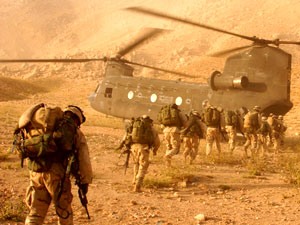Ignorance of Afghan society and botched U.S. raids
By Gareth Porter | Last updated: Apr 30, 2010 - 7:20:15 PMWhat's your opinion on this article?

Photo: MGN Online
|
In targeting the suspected Taliban in such raids, therefore, the U.S. military command has been forced to rely on informants of unknown reliability—and motives.
As a provincial council member from Gardez, near the scene of the botched raid, declared bitterly in early April, U.S. Special Forces “don't know who is the enemy and who isn't.”
When the commander of the Joint Special Operations Command, Adm. William McRaven, went to the site of the raid to apologize, the head of the extended family which lost five people to the SOF unit, Hajji Sharibuddin, demanded that the U.S. military turn over “the spy who gave the false information to the Americans.”
Gen. Stanley A. McChrystal and his chief of intelligence, Gen. Michael Flynn, have admitted the profound ignorance of the U.S. military about Afghan society, while avoiding the implications of that ignorance for the issue of false intelligence on the Taliban.
In an interview with National Public Radio Aug. 13, Gen. Flynn admitted, “What we really have not done to the degree that we need to is really truly understand the population: the tribal dynamics, the tribal networks, the ethnicity...”
And in an unusual paper published by the Center for a New American Security last October, Gen. Flynn was even more frank, saying, “I don't want to say we're clueless, but we are. We're no more than fingernail deep in our understanding the environment.”
Gen. Flynn avoided any suggestion that this profound ignorance of the society in which U.S. troops are operating could affect targeting of suspected Taliban. He asserted that the intelligence problem is not about the Taliban but about the lack of knowledge about governance and development issues.
But a foreign military force that is so fundamentally ignorant of the socio-political forces at play inevitably allows local sources which have access to it to act in their own self-interest.
More often than not, the U.S. and NATO have depended heavily on ties with Afghan tribal leaders and warlords. That has proven disastrous over and over again.
Col. David Lamm, who was chief of staff for Gen. David Barno, the top U.S. commander in Afghanistan from 2003 to 2005, has said that it became clear to top officials in the command that it should not make alliances with tribes to obtain information on the Taliban.
It often turned out that a group which a tribal leader said was the Taliban was actually a competing tribe, Col. Lamm recalled in a September 2008 interview with IPS.
Despite warnings, however, CIA and military intelligence operatives have continued to rely on tribal patriarchs and local warlords as intelligence sources on the Taliban. As recently as December 2008, U.S. intelligence officials were telling Washington Post reporter Joby Warrick that their operatives had been using gifts of Viagra, among other inducements, to get warlords and tribal leaders to provide such intelligence.
The inability of the U.S. military to organize its own networks of reliable agents has also led to a willingness to act with lethal force on the basis of tips from dubious sources.
UN Rapporteur Philip Alston wrote in a May 2009 report that “numerous government officials” had told him that “false tips” had “often” caused night raids to result in the killing of innocent civilians. He reported that one provincial governor had “stated that there were people in his province who made a business acting as intermediaries who would give false tips to the international forces in return for payment from individuals holding grudges.”
INSIDE STORIES AND REVIEWS
-
-
About Harriett ... and the Negro Hollywood Road Show
By Rabiah Muhammad, Guest Columnist » Full Story -
Skepticism greets Jay-Z, NFL talk of inspiring change
By Bryan 18X Crawford and Richard B. Muhammad The Final Call Newspaper @TheFinalCall » Full Story -
The painful problem of Black girls and suicide
By Charlene Muhammad -National Correspondent- » Full Story -
Exploitation of Innocence - Report: Perceptions, policies hurting Black girls
By Charlene Muhammad -National Correspondent- » Full Story -
Big Ballin: Big ideas fuel a father’s Big Baller Brand and brash business sense
By Bryan Crawford -Contributing Writer- » Full Story






 Click Here Stay Connected!
Click Here Stay Connected!








